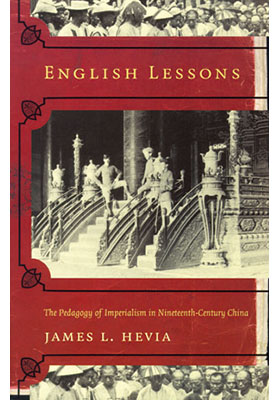English Lessons
The Pedagogy of Imperialism in Nineteenth-Century China
(向英國學習:十九世紀帝國主義在中國)
ISBN : 978-962-209-681-3
February 2004
416 pages, 6″ x 9″
Not for sale in the USA, Canada, or Europe
Inserting China into the history of nineteenth-century colonialism, English Lessons explores the ways that Euroamerican imperial powers humiliated the Qing monarchy and disciplined the Qing polity in the wake of multi-power invasions of China in 1860 and 1900. James L. Hevia focuses on the processes by which Great Britain enacted a pedagogical project that was itself a form of colonization,instructing the Manchu-Chinese elite on “proper” behavior in a world dominated by multiple imperial powers. The aim was to “bring China low” and make it a willing participant in British strategic goals in Asia. These lessons not only transformed the Qing dynasty but ultimately contributed to its destruction. Hevia examines British Foreign Office documents, diplomatic memoirs, auction house and museum records, nineteenth-century scholarly analyses of Chinese history and culture, campaign records, and photographs. By analyzing the circulation of military loot in Europe, the creation of an art history of “things Chinese,” the construction of a field of knowledge about China, and the Great Game rivalry between Britain, Russia, and Qing empire in Central Asia, he shows how Britain refigured its imperial project in China as a cultural endeavor.
“James Hevia takes the notion of imperial discipline and pedagogy beyond metaphor to precise illustration and explanation. With the help of a wonderfully selected set of prints and the mastery of an unusual set of archives, English Lessons manages to make of the familiar story of British imperialism in China something new and startling.” — Marilyn Young, Professor of History, New York University “I am very positive about this book because James Hevia’s efforts to move beyond a ‘China-centered approach’ are fresh and innovative. His chapters on the Boxers and their aftermath are the best part of the book. By reconstructing the polychromatic, global imperialist context circa 1900, Hevia thus builds on more recent views that have been drawn mainly from Chinese sources. Rather than essentialize ‘Western imperialism’ and ‘China’s victimization’ in black-and-white, Hevia presents a more penetrating account of Euro-America’s ‘civilizing mission’ before and after 1900.” — Benjamin A. Elman, Professor of East Asian Studies and History, Princeton University

